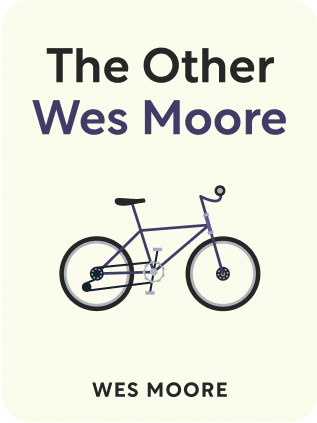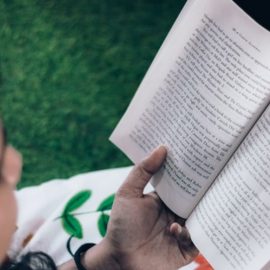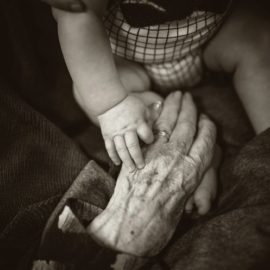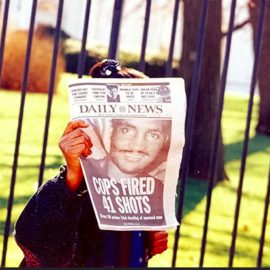

This article is an excerpt from the Shortform book guide to "The Other Wes Moore" by Wes Moore. Shortform has the world's best summaries and analyses of books you should be reading.
Like this article? Sign up for a free trial here .
Why are male role models so important in The Other Wes Moore? How did having or not having a positive male role model contribute to who the two Wes Moores became?
Male role models made the difference for Moore because he had people who steered him to look for more in life. On the other hand, the other Wes Moore didn’t have any positive examples and lacked guidance in life.
Read more to learn how having positive male role models helped Wes Moore succeed in life.
Growing Up Without Male Role Models
Author Wes Moore has few memories of his father, Westley Moore, but he remembers the day his father taught him what it meant to be a man.
Moore’s father was often the voice of reason in the house. Westley was a slender man, standing six foot two with a large mustache and manicured afro. He told Moore that physical violence is never the answer, especially when females were involved. Moore’s life was turned upside down after his father died.
Moore had more advantages than most kids in his neighborhood, but he never appreciated them. He didn’t take life seriously, and his arrogance and aloofness cost him.
Moore’s performance in school continued to deteriorate at such a rate, his teachers were convinced he had a learning disability. Joy was starting to believe them. She couldn’t think of another explanation for her son’s poor grades and seeming inability to retain information.
With almost no supervision and no positive male role models, Moore was able to devise a strategy for skipping school without punishment. Attendance was recorded in homeroom each day. Moore had a young and inexperienced homeroom teacher and took advantage of her. He tormented her by goofing off in class until she became so frustrated, she didn’t want him around. A sort of mutual understanding was developed between them. He wouldn’t show up and disrupt her class, and she would turn a blind eye to his absences.
Military School
Despite all of his mother Joy’s threats about military school, Moore never took her seriously. Joy may not have taken the idea seriously either, but once she learned about Moore’s behavior at school, things changed.
The dean of Riverdale phoned the house one night with news of Moore’s academic and disciplinary probation. His grades were poor, his attendance was worse, and there’d been an incident with a smoke bomb at school. Joy listened to all of it with a stoic face.
Military school was the last place Moore thought he would end up, but that’s exactly where he found himself at the age of twelve.
One day he noticed a tall and muscular black man talking with his superior officer while in line for lunch. Moore had seen the same man in the office the night before but didn’t know who he was.
After the two men were finished talking, the man, Cadet Captain Ty Hill, walked over to where the F Company stood. The F Company was the most renowned squad in the academy and made up of college freshmen and sophomores. Moore assumed Hill would fall back in line, but instead, all one hundred twenty members of the squad snapped to attention. Hill took the front of the line as their leader.
Moore couldn’t help but be impressed by Captain Hill. He had seen people in his neighborhood, like Shea, command respect because of their association with the gangsters, but he’d never seen anything like this. He now understood how different his new surroundings were to the Bronx. Respect wasn’t a product of fear or intimidation. It was earned through meritorious actions. Captain Hill was one of Moore’s first positive male role models after losing his father.
Wes Moore and Colin Powell
One book, in particular, influenced his shift in life goals. Colin Powell’s memoir, My American Journey, spoke to Moore in a way no other book had. Powell was a Bronx native, and he spoke of his struggles with discrimination and civil rights as a young man and soldier. Powell believed in the military, in which black Americans had more freedom than at home. He saw how the military helped spawn progress at a national level, and he was grateful for the way the Army helped him learn to love his country.
Powell’s book spoke to Moore’s experiences. Moore wanted to rise above the stereotypes held about young black men, especially those from urban environments. Like Powell, he also sought a path to something greater than himself. Moore wasn’t foolish enough to believe he could overcome the tenets of racism in America. But Powell had shown him a different perspective of race and opportunity, and Moore began to think about his life differently. Powell became Moore’s second influential male role model.
When Moore thought about who’d been the most influential people in his life, he realized that, besides his family, all were military men. These men had taught him the value of public service, the importance of history, and the difficult nature of leadership. They taught him to respect integrity, strength, and the significance of hard work.
In the Bronx, the impermanence of life created apathy or resentment in many people. But the military had given him another way to look at the fleeting nature of life. The impermanence of life highlighted the importance of making each day count. Moore knew that life was precious, and he wanted his to have meaning.
Basketball was not his future. He decided to enroll in Valley Forge’s junior college and work his way up to a leadership role in the U.S. Army. After high school, Moore was promoted to regimental commander for the 70th Corps of Cadets. This position made him the highest-ranking cadet and responsible for training more than seven hundred cadets in the program. He was eighteen years old.
Thanks to a few positive male role models, Moore was able to turn his life around and get on the right track.
The Other Wes Moore: No Male Role Models
In contrast with Moore, the other Wes Moore (Wes) grew up with an absentee father and his only male role model in life was his older brother, Tony. By age ten, Tony was already involved in drug deals. By 1984, at fourteen, he was a notorious gangster.
Despite his gangster lifestyle, Tony was like any other young boy growing up in poverty. He was sad, angry, insecure, and struggling to understand who he was and what he could be. He didn’t have anyone who believed in him, so he didn’t believe he could do more with his life. But Wes didn’t have to follow his path. Tony wanted to be the person who had faith in Wes. He showed Wes love and support and did everything he could to make sure Wes felt it.
Tony hammered home the importance of school in Wes’s life and the need to make something of himself. He knew he was being hypocritical, but he didn’t care. If Tony had another chance at life, he would do things differently. At least he could use his experiences to save Wes from falling into the same trap.
Despite Tony’s efforts to save Wes, his advice would eventually be Wes’s undoing. Part of Tony’s attempts included making sure Wes knew how to protect himself. Tony knew all too well the struggles Wes would have to face growing up in their neighborhood, so he taught Wes how to fight back and “send a message” to anyone who disrespected him.
One morning, Wes’s friend Woody came over early to toss the ball around in the streets. Other kids came out to join their game, and things seemed fine for a while. Wes was aggressively guarding a boy who was smaller and weaker than he was. He pushed and shoved the boy around so much, the boy finally reached his limit and confronted Wes. The two argued until the smaller boy punched Wes in the face. It was the first time Wes had been punched like that. His lip was broken and bleeding, and blood dripped onto his favorite jersey. Wes formed fists at his side, but instead of attacking the boy, he ran home.
Of all the advice Tony had given Wes, the only thing he ever listened to was “send a message.” As Wes ran from the fight and entered his house, this advice echoed in his mind.
Woody followed Wes and found him in the kitchen with one hand holding a towel against his bleeding lip and the other holding a knife. Woody tried to talk his friend down, even blocking Wes’s way out of the kitchen, but Wes would not be deterred.
What neither knew was that neighbors, witnessing the fight, had called the police. Two cop cars pulled up and cornered the boys still in the street. Woody became distracted by the red and blue flashing lights and didn’t see Wes slip by him.
Wes was taken to the police station and booked. He used his phone call to call Tony, and Tony’s father picked him up. Wes was back at the house before his mother was done with work. She wouldn’t find out that her eight-year-old son had been arrested for years.
Years later, Tony learned that his little brother had become involved in the drug trade. Defeated, tired of being a broken record, and tired of being the only person who seemed to care about Wes’s future, Tony shut down. He told Wes he was finished trying to save him. He turned and stalked off. It was the last time he would ever talk to Wes about drugs again.
Wes felt rejected by the one person he looked up to. He had lost his guide. But he was fourteen. He wasn’t a child anymore. He could go it alone from now on.
After Tony abandoned him, Wes had no more male role models left. With no guidance, Wes lived his life as a drug dealer and eventually ended up in prison for his part in the murder of a police officer.
Moore’s Takeaway
Moore believes that young people need strong mentors in their lives. The tendency to focus only on what is right in front of them is strong in young people. What made the difference for him were all the people who steered him to look for more than that. They helped him see that being black and poor, not having a father, and living in underserved and crime-ridden communities didn’t dictate what kind of future he could have. They allowed him to understand what freedom meant. Both he and Wes hope that kids today will understand that this freedom exists. Moore believes it is the responsibility of all of us to make sure they do.

———End of Preview———
Like what you just read? Read the rest of the world's best book summary and analysis of Wes Moore's "The Other Wes Moore" at Shortform .
Here's what you'll find in our full The Other Wes Moore summary :
- How two men from similar communities can have vastly different lives
- What led one Wes Moore to become a Rhodes Scholar
- What led the other Wes Moore to a life sentence






